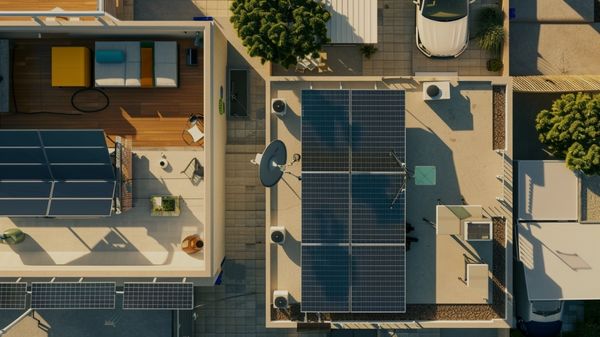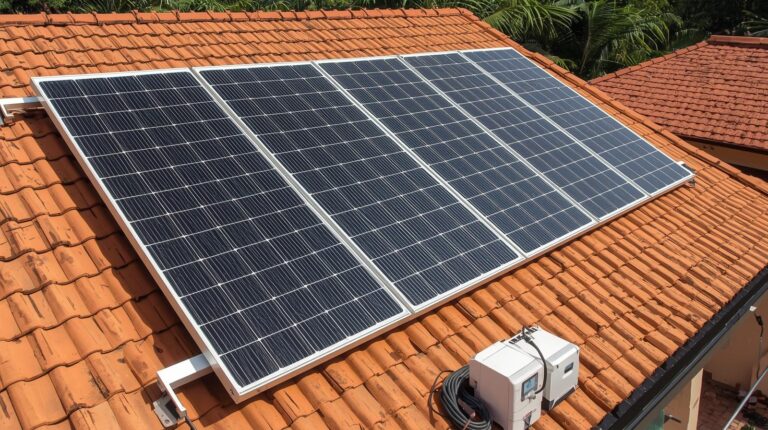With a 15kW solar system, you can power a variety of appliances and equipment effectively and sustainably. These include kitchen appliances like refrigerators, dishwashers, ovens, and coffee makers, which range from 150 to 5000 watts.
Laundry machines such as washing machines and dryers require 500 to 5000 watts per load. For commercial use, industrial machinery, power tools, printers, and agricultural equipment can be supported.
Heating and cooling systems with energy-efficient HVAC units and smart thermostats can be powered. Additionally, off-grid applications like remote cabins, agricultural use, event power, and emergency situations can benefit. Harnessing solar energy efficiently can enhance energy efficiency across multiple sectors.
Key Takeaways
- Power multiple kitchen appliances like refrigerators, dishwashers, and ovens.
- Run laundry machines efficiently, including washing machines and dryers.
- Support commercial equipment such as printers, power tools, and industrial machinery.
- Efficiently power heating and cooling systems with thermal storage and smart thermostats.
- Provide off-grid applications for remote cabins, agricultural use, events, emergencies, and battery storage.
Household Appliances
If you’re considering what to run on a 15kW solar system, understanding the energy consumption of your household appliances is essential. When it comes to powering your kitchen appliances and laundry machines, here are some key points to keep in mind:
Kitchen Appliances:
- Refrigerators: On average, a refrigerator consumes around 150-800 watts, depending on its size and efficiency.
- Dishwashers: These appliances typically use about 1200-2400 watts per cycle.
- Ovens: Electric ovens can require 1000-5000 watts, while microwaves are more energy-efficient at 600-1500 watts.
- Coffee Makers: Coffee machines usually consume around 800-1200 watts.
- Adding to the efficiency of your kitchen appliances, consider utilizing solar power to reduce carbon emissions and save on energy costs.
Laundry Machines:
- Washing Machines: Front-loading washers generally use 500-1000 watts, while top-loading machines may require 700-1500 watts.
- Dryers: Electric dryers can use 1800-5000 watts per load.
- 【Compact & Space-Saving 】 Midea WHS-65LB1 mini fridge with 18.6*17.7*19.4 inches(W*D*H...
- 【Easy to Daily Use】The easily mechanical adjustable thermostats allow you to keep your chilled...
- 【Reversible Door & Removable Glass Shelf】 The reversible door accommodates most spaces with a...
- The full-automatic washing machine equipped with Heavy, Soft, Normal, Rapid, and Soak 5 programs and...
- This top load compact washing machine with the only 18.1inch in width, 17.7inch in-depth, and...
- With the transparent lid design, this washing machine allows you to see and monitor the water and...
Commercial Equipment
Understanding the energy requirements of your household appliances is essential for optimizing your solar system‘s usage. When it comes to running commercial equipment on a 15kW solar system, you can power a variety of industrial machinery and agricultural equipment.
Here are some examples of what you can run on your solar system:
Industrial Machinery:
- Small to medium-sized manufacturing equipment such as conveyor belts, packaging machines, and small pumps.
- Power tools like drills, saws, and sanders in workshops or factories.
- Commercial-grade printers, scanners, and copiers in office settings.
Agricultural Equipment:
- Farm machinery like irrigation systems, small pumps, and electric fences.
- Greenhouse equipment such as fans, heaters, and lighting systems.
- Grain dryers and crop processing machinery for agricultural facilities.
Heating and Cooling Systems
When considering a 15kW solar system, powering your heating and cooling systems efficiently is essential. To maximize solar energy efficiency for these systems, you can follow these tips:
- Utilize Thermal Storage: Consider incorporating thermal storage solutions into your heating and cooling systems. Thermal storage allows you to store excess heat or coolness generated during peak sunlight hours for later use when the sun isn’t shining as brightly.
- Opt for Energy-Efficient HVAC Systems: Choose energy-efficient heating, ventilation, and air conditioning (HVAC) systems that require less power to operate, thereby making the most of your 15kW solar system’s capabilities.
- Smart Thermostat Integration: Integrate smart thermostats into your heating and cooling systems to regulate temperature more effectively and reduce energy wastage.
- When considering energy needs, ensure that the heating and cooling systems you select align with the capacity of your 15kW solar system.
Electric Vehicles
To continue maximizing the efficiency of your 15kW solar system, exploring the integration of electric vehicles can further enhance your sustainability efforts. By utilizing solar charging for your electric vehicle, you not only reduce your carbon footprint but also save on energy costs.
Solar panels can power your vehicle and increase energy independence. Check out the table below for an overview of the benefits and considerations when incorporating electric vehicles into your solar-powered lifestyle.
| Benefits | Considerations | Tips |
|---|---|---|
| Lower fuel costs | Charging infrastructure | Take advantage of off-peak charging times |
| Reduced emissions | Range limitations | Plan your trips efficiently to maximize battery life |
| Energy savings | Initial cost | Look for government incentives and rebates |
| Minimal maintenance | Charging time | Invest in a Level 2 charger for faster charging |
Off-Grid Applications
Exploring off-grid applications for your 15kW solar system opens up a world of possibilities for self-sufficiency and environmental consciousness.
With battery storage, you can harness excess energy generated during the day for use at night or during cloudy periods, ensuring a consistent power supply. Remote monitoring allows you to track system performance and troubleshoot issues from anywhere, providing peace of mind and efficient maintenance.
Here are some off-grid applications for your 15kW solar system:
- Powering a remote cabin or tiny house, enabling you to live off the grid sustainably.
- Running agricultural equipment such as water pumps, irrigation systems, and electric fences in remote locations.
- Providing electricity for outdoor events, construction sites, or emergency response situations where grid power is unavailable.
With the right setup and monitoring, your 15kW solar system can empower you to embrace off-grid living while minimizing your environmental impact.
Conclusion
A 15kW solar system can power a wide range of household appliances, commercial equipment, heating and cooling systems, electric vehicles, and off-grid applications. With the ability to generate ample electricity from the sun, this system offers a sustainable and efficient solution for meeting your energy needs. Imagine a world where your power comes from the sun, providing clean and renewable energy for all your daily activities.






